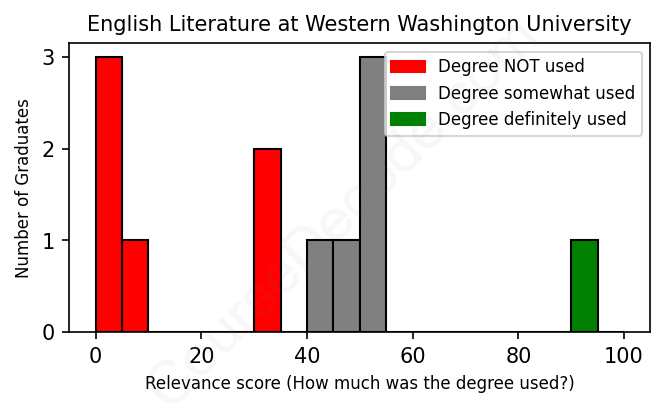
First, some facts. Of the English Literature graduates from Western Washington University we've analyzed , here's how many have used (or NOT used) their degree in their career:

These are estimates based on AI analysis of 12 LinkedIn profiles (see below).
The verdict? Horrible! Overall, with an average relevance score of 34%, English Literature graduates from Western Washington University have an exceptionally lower likelihood (-33%) of finding work in this field compared to the average graduate across all fields:
And for comparison, here's the chart for all profiles we've looked at across all degrees.
Also, after graduating, 41% of these graduates have pursued further education other than another Bachelor's degree (such as a Masters degree or other), compared to the average across all profiles of 35%. This suggests you may need more than just a Bachelors degree to be competitive as a English Literature graduate.
See the details:
|
Relevance score: 0% We think this person has NOT gone into a career related to their degree. We think this person has NOT gone into a career related to their degree.
DEGREE INFOGraduated in 2019 from Western Washington University with a Bachelor of Arts - BA in English Literature. Also pursued further education since (see below). JOB HISTORY SINCE GRADUATIONAdministrative Assistant Brigham and Women's Hospital Feb 2020 - Mar 2022 FURTHER DEGREES DONE SINCE GRADUATINGCertificateIYRS School of Technology & Trades 2022 - 2023 ABOUTNo information provided. |
The top 10 most common jobs done by the graduates we've analyzed (ranked most common to least) are:
From the profiles of English Literature graduates from Western Washington University, it seems that many have ventured into roles that don't directly align with their degree. A significant number are found in educational positions like teaching and administrative roles, which utilize some skills acquired during their studies, such as communication and analytical abilities. For example, jobs like Graduate Instructor of Composition and various teaching positions directly relate to the skills gained from an English Literature degree, while others such as Administrative Assistant or Project Manager lean more toward general skills rather than the specific literary knowledge. It’s clear that while some alumni are actively working in literature-related fields, others tend to gravitate towards more practical or managerial positions where English skills are only a part of what they need.
Overall, there’s a diverse mix of jobs that these graduates have taken on. Many have secured roles in libraries and education, showing a strong connection to their literary background. However, a noticeable number of them have moved into sectors like administrative work, financial services, and project management—areas that don't overly require literature-specific skills. While these roles can benefit from general communication and writing skills, it raises the question of how aligned their career paths are with their original degree. So, for anyone pursuing English Literature, it's worth considering how your skills can translate into a wide variety of jobs—even if that doesn't mean teaching Shakespeare every day!
Here is a visual representation of the most common words in job titles for English Literature graduates (this is across all English Literature graduates we've analyzed, not just those who went to Western Washington University):

The careers of graduates from Western Washington University with degrees in English Literature show quite a range of trajectories. Right after graduation, many of them tend to land roles in education or support positions, such as teaching, administrative work, or library services. For example, some graduates took on roles as educators in settings like the Peace Corps or became Graduate Instructors, suggesting that a solid number were drawn to teaching careers from the get-go. Others showed an inclination towards administrative and analytical roles, as evidenced by positions in government or financial organizations. It’s a mixed bag, but there seems to be a general trend toward starting in supportive or educational roles.
Looking at the longer-term careers, the picture becomes more diverse. After five to ten years, some alumni transitioned into managerial positions or specialized roles in different fields. For instance, individuals moved from teaching to roles like Policy and Implementation Manager or Senior Manager in various corporate environments. However, not all have found paths closely related to English Literature; some have navigated into roles like mortgage loan assistance or store management, which might not be as directly tied to their degree. Overall, while some graduates do pursue fulfilling careers in education or related fields, many seem to have branched out into areas that may not fully utilize their degree in English Literature. It's definitely a mix, and while there are success stories, there are also graduates who might be doing very different work than what they envisioned when they chose this major.
Honestly, a Bachelor’s degree in English Literature at Western Washington University—or really anywhere—can be a bit of a mixed bag in terms of difficulty. It definitely has its challenging moments, especially if you’re diving into complex texts and critical theories, but if you love reading and writing, it can also be super enjoyable. You’ll be required to read a lot, so if you’re not into that, it might feel a bit overwhelming at times. The workload can be heavy with papers and discussions, but a lot of students find the subject matter really engaging, which makes it easier to handle. Overall, it’s not the easiest degree out there, but if you’re passionate about literature, it’s totally manageable.
Most commonly, in the LinkedIn profiles we've looked at, it takes people 2 years to finish a Bachelor degree in English Literature.
From what I see, it looks like the English Literature grads from Western Washington University have had a mixed bag in terms of earning potential. Many of them have landed steady jobs, especially those who climbed the ranks in education and policy roles, which usually offer decent salaries over time. However, some are still in entry-level or part-time positions, like the courtesy clerk or those in teaching roles, which might not pay as well. It really depends on the specific job and how far they've progressed in their careers. Overall, while some seem to be doing pretty well, others might be scraping by a bit more than they'd like.
Here is a visual representation of the most common words seen in the "about" section of LinkedIn profiles who have a Bachelor degree in English Literature (this is across all English Literature graduates we've analyzed, not just those who went to Western Washington University). This may or may not be useful:

Here are all colleges offering a Bachelor degree in English Literature (ordered by the average relevance score of their English Literature graduates, best to worst) where we have analyzed at least 10 of their graduates: